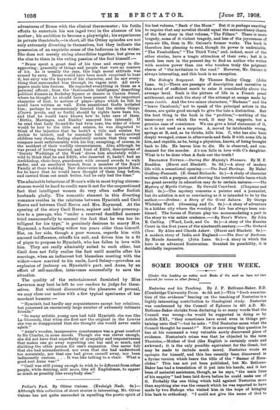The Bishop's Scapegoat. By Thomas Bailey Clegg. (John Lane. 6s.)—There
are passages of description and narrative in this novel of sufficient merit to raise it considerably above the average level. Such is the picture of life in a French penal settlement, and such the story of the attempt at escape made by some evades. And the two minor characters, "Madame" and the "brave Cacalouch," not to speak of the principal actors in the drama, are quite good enough to give the tale a distinction. But the best thing in the book is the "problem,"—nothing of the unsavoury sort which the word, it may be, suggests, but a genuine case of conscience. We can give a brief statement of it, as it is not used as a surprise. A, moved by intolerable wrong, springs at B, and, as he thinks, kills him. C, who has also been deeply wronged, comes in afterwards and finds B with some life in him, and capable, as he, being a physician, knows, of being brought back to life. He leaves him to die. He is observed, and con- demned for the murder. A's son falls in love with C's daughter. What is to be done when A finds out the truth?






















































 Previous page
Previous page